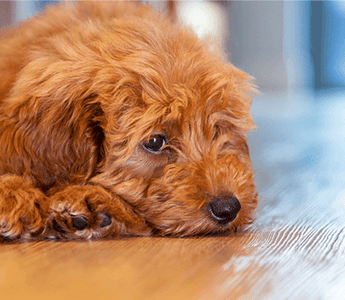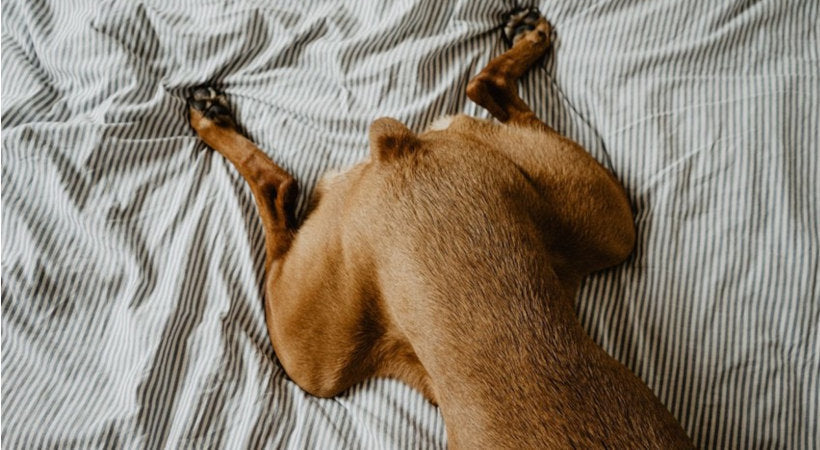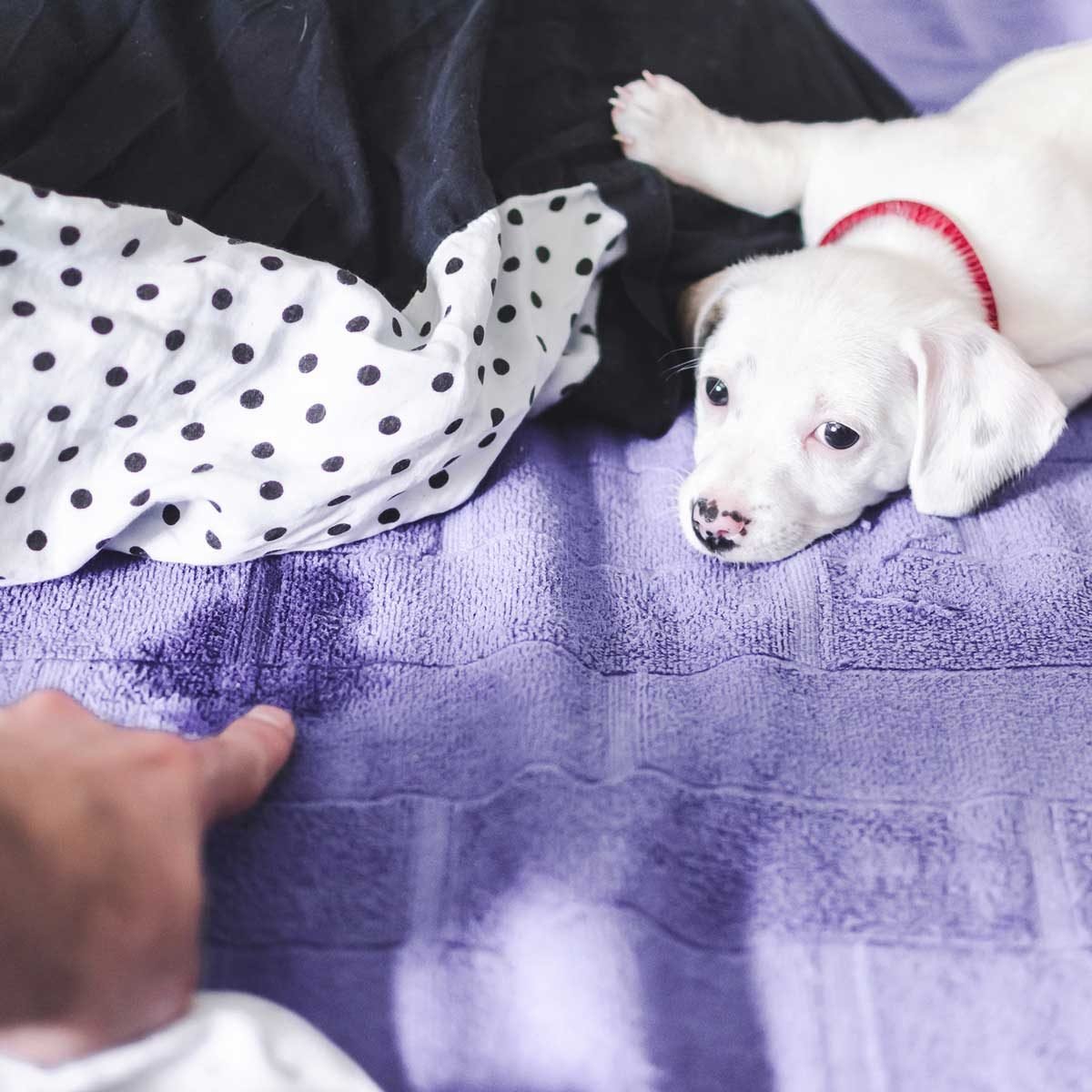Have you ever walked into your dog’s room only to find their bed wet—and wondered, “Why does my dog pee on his bed on purpose?” It’s frustrating, confusing, and honestly, a bit upsetting. You love your dog and want to keep their space clean and comfortable.
But when your furry friend keeps doing this, it feels like something is wrong. Understanding why this happens can help you fix the problem and bring peace back to your home. Keep reading, and you’ll discover the surprising reasons behind this behavior—and what you can do about it.
Marking Territory
Marking territory is a natural behavior in dogs. It helps them feel safe and confident in their space. When a dog pees on his bed on purpose, it often relates to marking. This action sends a clear signal to other animals. It tells them, “This is my place.”
The Role Of Scent In Canine Behavior
Scent plays a big role in how dogs communicate. Dogs have a strong sense of smell. They use it to learn about their environment and other animals.
Each dog has a unique scent. When they leave their scent, they share information about themselves. It can show their identity, mood, or status. This helps dogs understand their social world.
Why Dogs Use Urine To Claim Ownership
Urine carries strong scent markers. When dogs urinate on their bed, they leave a personal signature. This scent mark tells others that the bed belongs to them.
Urine marking is quick and effective. It lasts longer than other scent marks. Dogs use this method to protect their space from intruders.
Understanding The Importance Of Scent Marking In Dogs
Scent marking helps dogs feel secure. It reduces stress by defining safe zones. This behavior also establishes social order among dogs.
Through scent marking, dogs avoid conflicts. They respect each other’s boundaries. This keeps peace within their territory.
Anxiety And Stress Relief
Dogs feel stress and anxiety just like people do. These feelings can cause unusual behaviors. One common reaction is peeing on their bed. This act helps them manage their emotions in a tough moment.
Understanding why dogs use this behavior helps owners respond with kindness. It also guides them to find better ways to help their pets feel calm and safe.
The Connection Between Anxiety And Urination
Stress triggers a strong physical response in dogs. The body releases hormones that affect the bladder. This can cause sudden urges to urinate. Anxiety can make a dog lose control over where it pees.
When a dog feels uneasy, it might pee more often. This is not about being naughty. It is a natural reaction to fear or discomfort.
How Dogs Use Peeing As A Coping Mechanism
Peeing on their bed can soothe a dog’s nerves. The scent marks the area as a safe place. It gives the dog a sense of security in a confusing world.
This behavior is a way to calm down and reduce tension. The dog may repeat this action whenever feeling stressed.
Signs Of Anxiety In Dogs That May Lead To Peeing On The Bed
- Excessive barking or whining
- Pacing or restlessness
- Shaking or trembling
- Hiding or avoiding people
- Loss of appetite
- Destructive chewing or digging
Recognizing these signs early can prevent accidents. It helps owners provide support and comfort to their dogs.
Medical Issues
Medical issues often cause dogs to pee on their beds. Sometimes, this behavior is not about training or attention. It can be a sign that your dog feels unwell or faces health problems. Understanding these medical causes helps you care better for your pet.
Urinary Tract Infections And Other Health Problems
Urinary tract infections (UTIs) are common in dogs. UTIs cause frequent, urgent urination. Your dog may not make it outside in time. Other health problems can also lead to accidents.
- Bladder stones
- Kidney disease
- Diabetes
- Hormonal imbalances
These issues affect how your dog controls urination. Pain or discomfort can make your dog avoid holding urine.
How Medical Issues Can Cause Peeing On The Bed
Medical issues can disrupt your dog’s normal bathroom habits. They may feel pain or urgency that is hard to control. Your dog may go where it feels safe, like the bed. Sometimes, your dog cannot hold urine long enough to go outside.
Health problems also affect your dog’s energy and mobility. This makes it harder to reach the bathroom in time. Your dog may not understand why accidents happen, causing confusion and stress.
Common Medical Issues That May Lead To Peeing On The Bed
| Medical Issue | Symptoms | Effect on Urination |
|---|---|---|
| Urinary Tract Infection (UTI) | Frequent urination, pain, blood in urine | Urgency and accidents |
| Bladder Stones | Pain, difficulty urinating, blood in urine | Incontinence and accidents |
| Kidney Disease | Increased thirst, frequent urination | Loss of bladder control |
| Diabetes | Increased thirst and hunger, weight loss | Frequent urination and accidents |
| Hormonal Imbalances | Changes in appetite, weight, behavior | Loss of bladder control |
Consult a vet if your dog pees on the bed often. Early diagnosis can prevent further health issues.

Credit: bullybeds.com
Attention Seeking
Dogs often use behaviors to get their owner’s attention. Peeing on their bed can be one of those behaviors. This act may seem frustrating, but it often signals a need for more interaction. Dogs crave attention and may choose unusual ways to get it.
Why Dogs May Pee On The Bed To Get Attention
Dogs learn quickly that certain actions get a reaction from their owners. Peeing on the bed is a strong way to get noticed. This behavior can happen if the dog feels ignored or lonely. The dog may not understand other ways to ask for play or affection. The bed is a place the dog associates with the owner, making it a target for attention.
The Role Of Reinforcement In Attention-seeking Behavior
Owners often react strongly to bed-peeing. This reaction, even if negative, can encourage the dog to repeat the behavior. The dog sees that peeing on the bed brings a quick response. This is called reinforcement. If the dog gets scolded or comforted, it learns this action works to get attention. Over time, this creates a pattern hard to break.
How To Stop Your Dog From Peeing On The Bed For Attention
Ignore the behavior to reduce its appeal. Avoid giving any reaction when the dog pees on the bed. Praise and reward the dog when it behaves well. Increase playtime and interaction to meet the dog’s need for attention. Provide toys and activities to keep your dog busy. Consistency is key to changing this habit.
Lack Of Training Or Housebreaking
When your dog pees on his bed, lack of training or housebreaking is often a key reason. Dogs don’t naturally know where to relieve themselves without guidance. If you haven’t clearly taught your dog where it’s okay to pee, he might choose his bed simply because it feels like his safe space.
Common Mistakes That Can Lead To Peeing On The Bed
- Not establishing a consistent bathroom routine confuses your dog about when and where to go.
- Using harsh punishment after accidents can cause anxiety, making your dog urinate in his bed out of stress or fear.
- Ignoring early signs that your dog needs to go out leads to accidents inside the house.
- Allowing your dog free access to the bed before he is fully housebroken can encourage this behavior.
The Importance Of Consistent Training And Housebreaking
Consistency is crucial in teaching your dog where to pee. If you let him off the leash sometimes but scold him other times, your dog won’t understand what you expect.
Dogs learn best with a routine that includes regular potty breaks and positive reinforcement when they go outside. Consistency builds trust and clarity, reducing accidents on the bed or elsewhere.
Tips For Effective Housebreaking And Training
- Set a regular schedule for potty breaks, especially after meals, naps, and playtime.
- Use a specific command like “go potty” to help your dog associate words with the action.
- Reward your dog immediately with treats or praise when he pees outside to reinforce good behavior.
- Keep the dog’s sleeping area clean and limit access to the bed until housebreaking is complete.
- Supervise your dog closely indoors and interrupt any attempts to pee inside with a gentle redirect outside.
Think about your dog’s behavior and your training approach. Are you consistent enough? Could adjusting your schedule and rewards help your dog feel more confident about where to go?

Credit: walkinpets.com
Boredom And Lack Of Stimulation
Boredom and lack of stimulation can lead your dog to develop some puzzling habits, like peeing on their bed. Dogs need mental and physical activities to stay happy and healthy. When they don’t get enough engagement, they may act out in ways that frustrate you and confuse them.
Why Dogs May Pee On The Bed Due To Boredom
Dogs often pee on their beds because they feel restless or ignored. Without enough interaction or playtime, they might use urination as a way to grab your attention. Sometimes, it’s a sign of frustration—they simply don’t know how else to express their emotions.
Consider your dog’s daily routine. Is there enough time spent walking, playing, or training? If the answer is no, boredom could be the root cause of this behavior. Have you noticed your dog chewing on furniture or pacing? These are other signs they might need more stimulation.
The Importance Of Mental And Physical Stimulation For Dogs
Mental and physical stimulation are crucial for your dog’s well-being. Without them, dogs can develop anxiety, destructive habits, or unwanted behaviors like peeing in the wrong places. Keeping their brain and body active helps reduce stress and improves their overall mood.
Dogs are naturally curious and energetic. Activities like puzzle toys, obedience training, and regular exercise fulfill their need to think and move. When your dog feels tired and mentally satisfied, they’re less likely to act out in negative ways.
Ways To Keep Your Dog Engaged And Active
- Daily Walks:Aim for at least 30 minutes of walking to burn off energy.
- Interactive Toys:Use treat-dispensing puzzles to challenge their mind.
- Training Sessions:Teach new commands or tricks to stimulate their brain.
- Playtime:Spend time playing fetch or tug-of-war to strengthen your bond.
- Socialization:Arrange playdates with other dogs to provide new experiences.
Have you tried mixing up your dog’s activities to see what excites them most? Sometimes, small changes can make a big difference in their behavior and happiness.
Hormonal Changes
Hormonal changes can strongly affect a dog’s behavior. These shifts happen naturally and can cause confusion or stress in dogs. When hormones fluctuate, dogs may act differently, including peeing on their bed on purpose. Understanding these changes helps explain this puzzling behavior.
The Impact Of Hormonal Changes On Canine Behavior
Hormones control many body functions and emotions. In dogs, hormonal shifts can trigger anxiety, restlessness, or marking habits. These feelings can make a dog feel insecure or unsettled. As a result, a dog might pee on their bed to mark territory or find comfort.
How Hormonal Changes Can Lead To Peeing On The Bed
During hormonal changes, a dog’s bladder control may weaken. Stress from these changes can cause accidents in unusual places. Peeing on the bed might be a way to cope or send a message. This behavior can also relate to marking due to increased hormones.
Common Hormonal Changes That May Affect Dogs
- Spaying or neutering alters hormone levels significantly
- Heat cycles in female dogs bring strong hormonal shifts
- Age-related hormone changes can cause behavior shifts
- Medical issues like thyroid problems affect hormones
Puppy Behavior
Puppy behavior plays a big role in why your dog might pee on his bed. Puppies are still learning about their bodies and the rules of the house. Their small bladders mean they need to go often. They also do not yet understand where it is okay to pee. This can cause accidents, including on their bed.
Why Puppies May Pee On The Bed Due To Immaturity
Puppies have weak bladder control at first. Their muscles are not strong enough to hold urine for long. They might not feel the need to go soon enough. Sometimes, they get too excited or scared and pee without meaning to. They also do not know the difference between their bed and other places. This immaturity makes accidents common in early months.
The Importance Of Supervision And Training For Puppies
Watching your puppy closely helps stop accidents. Puppies need guidance to learn where to pee. Supervision means catching signs like sniffing or circling. You can then take them outside right away. Training teaches your puppy the right place and time to pee. It builds good habits and trust between you and your dog.
Tips For Housebreaking And Training A Puppy
- Take your puppy outside often, especially after eating or sleeping.
- Use the same spot outside to help them learn.
- Praise and reward your puppy for peeing outside.
- Clean accidents well to remove smells and prevent repeat spots.
- Keep a regular schedule for feeding and bathroom breaks.
- Be patient and consistent; training takes time.
Age-related Issues
As dogs age, their bodies undergo many changes that can affect their behavior, including where they choose to relieve themselves. Peeing on their bed might not be an act of defiance but a sign of underlying age-related problems. Understanding these changes can help you respond with patience and care.
How Age Can Affect A Dog’s Bladder Control
Older dogs often experience a decline in bladder control due to weakening muscles and changes in the nervous system. This means they might not feel the urge to go outside in time or hold it as long as they used to. You might notice your dog struggling to hold their urine during the night or after long periods of rest.
Think about your own experience with aging—have you ever found it harder to control your bladder after a long day? Your dog faces similar challenges, which can lead to accidents in places they once kept clean.
Common Age-related Issues That May Lead To Peeing On The Bed
- Urinary Incontinence:A common problem in senior dogs where the muscles controlling urine release weaken.
- Arthritis:Painful joints can make it difficult for your dog to get up and go outside quickly.
- Cognitive Dysfunction:Similar to dementia in humans, it can cause confusion about bathroom habits and locations.
- Kidney or Bladder Infections:These can increase urination frequency and urgency.
Have you noticed your dog struggling to get off the bed or seeming confused about their usual routine? These signs often point to underlying health problems that need attention.
Tips For Managing Age-related Issues In Dogs
- Regular Vet Check-ups:Keep up with veterinary visits to catch and treat medical issues early.
- Provide Easy Access to Potty Areas:Place pee pads or litter boxes nearby, especially if mobility is limited.
- Use Waterproof Bedding:Protect your dog’s bed with waterproof covers to make cleanup easier.
- Maintain a Consistent Schedule:Take your dog out frequently to reduce accidents.
- Consider Supplements or Medications:Your vet may recommend treatments to improve bladder control.
Managing these age-related challenges requires patience and adjustment. Have you tried changing your dog’s routine or bedding to make life easier for both of you? Small changes can make a big difference in comfort and cleanliness.

Credit: www.embassyofpakistanusa.org
Frequently Asked Questions
Why Does My Dog Pee On His Bed Intentionally?
Dogs may pee on their beds due to anxiety, marking territory, or medical issues. It’s often a response to stress or discomfort. Identifying the cause helps in managing this behavior effectively and improving your dog’s comfort and hygiene.
Can Health Problems Cause My Dog To Pee On His Bed?
Yes, urinary tract infections, bladder stones, or incontinence can cause bed peeing. A vet checkup is essential to rule out medical causes before behavioral training.
How Can I Stop My Dog From Peeing On His Bed?
Clean soiled areas thoroughly, provide regular bathroom breaks, and reduce stress triggers. Training and positive reinforcement also help discourage this behavior over time.
Does Anxiety Make Dogs Pee On Their Beds?
Yes, anxiety or stress often causes dogs to urinate in inappropriate places. Creating a calm environment and consulting a vet or trainer can reduce anxiety-induced bed peeing.
Conclusion
Understanding your dog’s behavior helps solve the peeing issue. Comfort and security are key. Ensure your dog feels safe and loved. Check for health issues, too. A vet visit might be needed. Training and patience work wonders. Consistent routines help your dog adjust.
Observe your dog’s signals closely. Respond with care and guidance. Avoid punishment. Encourage positive behavior. Reinforce trust and bonding. Your efforts will pay off. A happy, dry bed awaits. Stay patient and attentive. Your dog needs you. Together, you can overcome this challenge.
A peaceful home for you and your furry friend.

